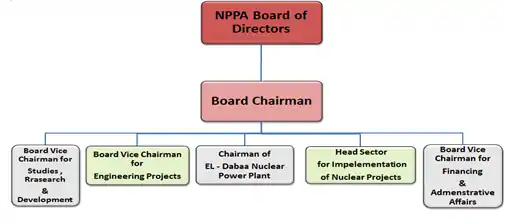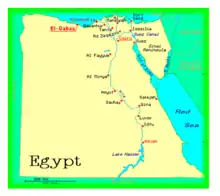Nuclear Power Plants Authority (Egypt)
The Nuclear Power Plants Authority is an Egyptian public economic authority of a special nature affiliated to the Ministry of Electricity and Renewable Energy
Incorporation
The Nuclear Power Plants Authority[1]was established by Law No.13 of the year 1976 and amendments by Law No. 210 of the year 2017, to be a public economic authority of special nature that is affiliated to the Ministry of Electricity and Renewable Energy. The Nuclear Power Plants Authority is exclusively entrusted with establishing, operating and managing nuclear power plants in Egypt and is headquartered in Cairo.
The Authority has the national capabilities that are coupled with scientific competency and accumulated experiences necessary to successfully carry out its tasks in the management of nuclear power projects in the Arab Republic of Egypt.
Mission and activities
- Undertaking the implementation of the peaceful nuclear power plant projects in Egypt.
- Implementing consecutive technical training programs in order to allow the trainees to acquire the – knowledge and skills required.[2]
- Ensuring high professional performance of the selected candidates, working at the NPP.
- Adopting strict working policies that secure safe operation of the plant, taking into consideration the environment and human health.
- Addressing all the public concerns with transparency via publications and different media platforms.
NPPA is entrusted to carry out other activities, including:
- Enforcing agreements with counter parties at home and abroad,
- Preparing and qualifying trainees at home and abroad, and
- Conducting research and studies required for the projects of establishing NPP.
Organizational structure

The Egyptian Nuclear Program
Egypt's Nuclear Program includes many contracts.[3]
Egypt, since the early 1950s, was one of the first developing countries that realized the importance of using nuclear energy to generate electricity and desalinate sea water to contribute to maximizing the utilization of Egypt's resources of primary energy and fresh water through:
- Diversifying sources of electric energy production.
- Developing and upgrading the national industry to the global level, with transferring and indigenizing this technology.
- Preserving energy resources, such as petroleum and natural gas, which are depleted and non-renewable resources. Therefore, they must be consumed with caution and wisdom so as not to deprive future generations of important resources for sustainable and independent development.
- Maximizing the added value of using petroleum and natural gas as an indispensable raw material in the petrochemical industries, as well as fertilizers and transportation sector instead of burning them to generate electricity.
- Reducing the rates of importing petroleum products, of which Egypt has become a net importer in recent years, for all uses that are increasing year by year despite the expansion in the use of natural gas.
El-Dabaa NPP Project

Efforts of Egypt and their governments throughout the years-long quest to enter the nuclear field have resulted in giving the start signal for the construction of the El-Dabaa nuclear power plant (DNPP), and it is planned to build four Russian- produced units of standard pressurized water with a capacity of 1200 megawatts (AES-2006) and this reactor belongs to the "Pressurized Water Reactor" type (Generation III reactors +), which are currently among the most modern reactors in the world.[4][5]
The Egyptian nuclear project is currently being implemented at the El-Dabaa site[6] at a distance of 150 km west of Alexandria on the Mediterranean coast in the north of the Arab Republic of Egypt, and it has been agreed to establish and operate the nuclear power plant between the Nuclear Power Plants Authority (NPPA) and The Russian company “the Rosatom State Corporation” as the project main contractor under a number of contracts such as the Engineering, procurement, and construction "EPC" contract, the fuel supply contract, the operation and maintenance contract, as well as the spent fuel contract.
Implementation stages of the El-Dabaa NPP Project
The first stage is preparatory for the project started in December 2017, and was expected to last about two years and a half. This stage aims to set up and prepare the site for the construction of the nuclear power plant.
The second stage will begin after obtaining permission to initiate construction and includes all building and construction works, employee training and preparation to start commissioning.
The third stage is the last after obtaining permission for pre-commissioning, which includes conducting commissioning and initiating on-site operation, and this stage continues until the initial handover of the first unit, as well as the issuance of the operating license.
The project progress is directly depending on the issuance of licenses, as their issuance aims to ensure that all the necessary legal documents are fulfilled for the safety and security of the power plant.
Accordingly, the NPPA is seeking to obtain all required licenses and permissions related to site, reactor design, construction, commissioning and commercial operation.[7]
Contracting with Russian company " the Rosatom State Corporation "[8]
Russia is currently considered one of the greatest exporters of nuclear reactors. It has existing nuclear power plant projects under construction in Bangladesh, Belarus, Finland, Hungary, China, India and Turkey. The Russian company “the Rosatom State Corporation” also has accumulated experience in the field of building and operating nuclear plants, as it has exported many nuclear plants in operation, numbering (96) reactors of different Russian models, which are efficiently operating in (14) countries.
Impact of the Project on the Egyptian national income
The implementation of the Egyptian nuclear project leads to many positive effects on the Egyptian national income in the following respects:
- The implementation of the program for the construction, operation and maintenance of nuclear plants will require thousands of trained manpower at all professional levels, which reduces the unemployment rate and positively reflects on the country's national income, where:
- A number of between 5000 - 6000 personnel participate in the construction of the power plant for a period of 6 consecutive years per unit, and in the case of implementing 4 units, the construction works will continue for about 10 years.
- About 1000 personnel also participate in the operation and maintenance of one unit, and in the case of 4 units the number reaches 4000 personnel over the operating life of the nuclear power plant, which is 60 years.
- Providing job opportunities in complementary industries and assisting various types of workshops such as (blacksmithing - electricity - plumbing - carpentry ...) workshops.
- The Egyptian nuclear program is going to lead to providing many new industries and raise the quality of the Egyptian current industry in line with the quality levels required for nuclear industries. This will necessarily lead to a great breakthrough in the capabilities of the local industry and its competitiveness in the local and global market, which will lead to improve the national income and improve the opportunities for self-sufficiency.[9]
- The expansion of the construction and use of the nuclear power plants to generate electricity is going to lead to a reduction in the rates of consumption of natural gas and petroleum, and their use in the petrochemical industries, which leads to an increase in their added value, which constitutes support for the national income.
- The production of electricity out of nuclear power plants is going to reduce the amount of support provided by the government to supply the consumer with electricity, which will have a positive impact on the national income of the country.
- Achieving a local participation rate of not less than 20% for the first unit, which gradually increases in line with the number of units to reach 35% for the fourth unit.
Achievements[10]
The El-Dabaa NPP was chosen as one of the three best nuclear projects in terms of commissioning on the sidelines of the launch of the eleventh session of the largest nuclear conference and exhibition in the world, "Rosatom Expo", which was held in Sochi, Russia, and this is the first award of its kind that a nuclear project receives in the Middle East. The award is the culmination of Egypt's efforts to reach the best specifications and terms that were contracted with the Russian partner implementing the El-Dabaa nuclear plant.[11]
See also
References
- "nuclear industry suppliers forum". www.zawya.com. Retrieved 2020-11-20.
{{cite web}}: CS1 maint: url-status (link) - "training course for egyptian specialists at russian".
{{cite web}}: CS1 maint: url-status (link) - "'Notice to proceed' contracts signed for El Dabaa - World Nuclear News". www.world-nuclear-news.org. Retrieved 2020-11-21.
- "El Dabaa Nuclear Power Plant, Egypt's first nuclear power plant". www.power-technology.com. Retrieved 2020-11-20.
- "رئيس هيئة المحطات النووية: الضبعة أكبر مشروع فى تاريخ مصر المعاصر..فيديو". صدى البلد. 2019-10-09. Retrieved 2021-01-02.
- "StackPath". dailynewsegypt.com. Retrieved 2020-12-16.
- "NPPA chief inspects work at Dabaa nuclear plant site".
{{cite web}}: CS1 maint: url-status (link) - "Egypt and Russia to sign contract for Dabaa nuclear power station". Ahram Online. Retrieved 2020-11-20.
{{cite web}}: CS1 maint: url-status (link) - "افتتاح منتدى «موردى الصناعة النووية» بالتعاون بين مؤسسة روساتوم وهيئة المحطات النووية لتوليد الكهرباء فى القاهرة - الجريدة العقارية". aleqaria.com.eg. Retrieved 2021-01-02.
- "الضبعة أفضل ثاني مشروع نووي بمعرض "إكسبو" في روسيا". مصراوي.كوم. Retrieved 2021-01-02.
- "'الضبعة' تفوز بجائزة 'روساتوم'.. ووزير الطاقة يشكر العاملين". جريدة الدستور. Retrieved 2021-01-02.